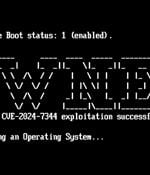Security News

A new UEFI Secure Boot bypass vulnerability tracked as CVE-2024-7344 that affects a Microsoft-signed application could be exploited to deploy bootkits even if Secure Boot protection is active. [...]

Details have emerged about a now-patched security vulnerability that could allow a bypass of the Secure Boot mechanism in Unified Extensible Firmware Interface (UEFI) systems. The vulnerability,...

ESET researchers have identified a vulnerability (CVE-2024-7344) impacting most UEFI-based systems, which allows attackers to bypass UEFI Secure Boot. The issue was found in a UEFI application...

The recently uncovered 'Bootkitty' UEFI bootkit, the first malware of its kind targeting Linux systems, exploits CVE-2023-40238, aka 'LogoFAIL,' to infect computers running on a vulnerable UEFI...

The first UEFI bootkit specifically targeting Linux systems has been discovered, marking a shift in stealthy and hard-to-remove bootkit threats that previously focused on Windows. [...]

ESET Research has discovered the first UEFI bootkit designed for Linux systems, named Bootkitty by its creators. Researchers believe this bootkit is likely an initial proof of concept, and based...

Cybersecurity researchers have shed light on what has been described as the first Unified Extensible Firmware Interface (UEFI) bootkit designed for Linux systems. Dubbed Bootkitty by its creators...

Bootkitty doesn’t bite… yet Security researchers say they've stumbled upon the first-ever UEFI bootkit targeting Linux, illustrating a key moment in the evolution of such tools.…

Damn Vulnerable UEFI (DVUEFI) is an open-source exploitation toolkit and learning platform for unveiling and fixing UEFI firmware vulnerabilities. Simulate real-world firmware attacks DVUEFI was...

Hundreds of UEFI products from 10 vendors are susceptible to compromise due to a critical firmware supply-chain issue known as PKfail, which allows attackers to bypass Secure Boot and install malware. As the Binarly Research Team found, affected devices use a test Secure Boot "Master key"-also known as Platform Key-generated by American Megatrends International, which was tagged as "DO NOT TRUST" and that upstream vendors should've replaced with their own securely generated keys.